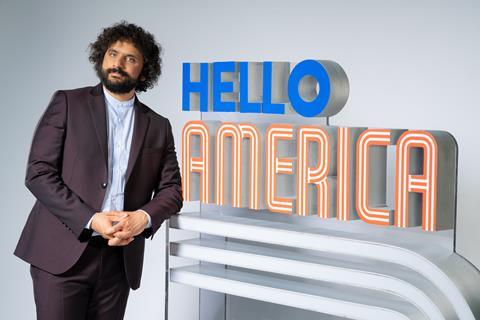The British comedian and broadcaster on Quibi series Hello America and why the BBC deserves credit for taking a chance on The Mash Report
Long ago, in a land called December 2019, Nish Kumar made headlines when heckling from a combative crowd at a Lord Taverner’s charity lunch culminated in one person throwing a bread roll at him.
The group took umbrage with Kumar’s anti-Brexit take and his unapologetically left-leaning approach to politics, and the incident led to a wider debate over the assumed political neutrality of comedians. Should Nish Kumar have known his audience better? Should Nish Kumar’s audience have known better?
For better or worse, he has since found it difficult to escape the ‘left-leaning agitator’ label and the Edinburgh Festival regular refuses to temper this approach on Hello America, the topical format he has been hosting since the start of last month for fledgling short-form streamer Quibi.

“Both Quibi and [Hello America producer] Jax Media have made me feel completely uninhibited,” he tells Broadcast.
“They know what my beliefs are. There are plenty of internal checks and balances to make sure I’m not talking absolute nonsense but I won’t dial things down – never.”
Coupled with a lockdown series of BBC2’s Mash Report – one that drew plaudits as other similar socially-distanced re-works were critically panned (see Have I Got News For You) – Kumar’s workload has been heavy.
“Thanking my lucky stars” has become his lockdown hobby, having neither fallen ill nor lost work, and he believes comedians are better positioned than most for extended work-from-home periods.
“If you’re in my position, there’s no point baking more sourdough – you just need to sit down and consider your immense good fortune,” he adds, steering the conversation back to bread.
Hello America
Hello America is the product of 18 months of labour and has been many more years in the making. Kumar was first approached several years ago at Edinburgh by Turner exec Colin Davis around using his brand of satirical comedy for a US format.
Fast-forward a few years and Davis, newly employed as a senior content executive for Quibi, returned to the idea, with Kumar almost instantaneously signing up.
The show’s creation has been iterative, as Kumar, the producers at New York/London-based Jax and a writing team have set about methodically seeking the right tone and adapting to Quibi’s demand for snappy, short-form content.
The result is a 26 x 8-minute UK take on the political situation in the US, imbued with Kumar’s somewhat-quintessentially British flavour throughout. The series launched on Quibi, whose ‘quick bites’ content selling point has been derailed by coronavirus lockdowns around the world, on 6 July.
Unlike similar US topical offerings, it launches every Friday and Monday morning, with the Friday show acting as a comical news roundup and Monday taking a look at one or two broader issues, normally featuring guest comedians.

Recent segments have included British comedian Sophie Duker smuggling universal healthcare into the US via a fictitious megachurch and Mash Report collaborator Rachel Parris on why the US should ape the UK by having an aristocracy.
Helming a short-form topical format that goes out in the mornings is certainly a first for Kumar, and one that is helped by geographical time zones. Kumar and the team record on Friday mornings in the UK, reacting quickly to all the latest breaking news, before the edit and rushes are sent off to the US, which is several hours behind.
Setting the tone
News and TX-patterns aside, Kumar’s main challenge has been the show’s tone.
How do you commentate on a country being led by a reality magnate who recently proposed bleach injections as a cure for Covid-19?
Kumar’s approach is to make light of every possible situation without patronising the American public, keeping in mind the UK hasn’t exactly covered itself in glory on the world stage recently.
“It would be an astonishing act of hubris for me to be sneery when you look at the UK’s current geopolitical situation,” says Kumar. “I’m not going to be that British person who sits there and says, ‘Aren’t all Americans insane and stupid’.”
Although pointing out several differences between Hello America and fellow Brit John Oliver’s Last Week Tonight (“We don’t do 25-minute segments on infrastructure policy”), Kumar is a huge fan of the Birmingham-born comic and has been inspired by his approach.

“John is brilliant at being savagely critical of US politicians without being condescending to a US audience,” he goes on to say.
“He is so unsparing but never castigates the wider public or speaks down to them. Managing that tone has been something he’s done amazingly from the beginning.”
The likes of Oliver and James Corden with his Late Late Show for CBS have been catapulted to stardom since landing late-night US talk shows.
Broadcast probes Kumar on why this genre has never taken off in the UK, with the possible exception of his own Mash Report, whose fourth series took a consolidated 1.1m/5.3% across six episodes in April and May on BBC2.
The Wandsworth-born comedian believes this is due to a lack of risk-taking combined with the UK television industry’s penchant for ‘authored’ programming from a single voice, in both scripted and non-scripted.
“If we’d initially been commissioned to do four episodes of the Mash Report, we’d have never come back”
Hello America is forged by a core team of Kumar plus four US and UK-born writers, while others are used on an ad-hoc basis.
“We do panel shows better than anyone and are excellent at author-driven sitcoms but for weekly topical shows you need to back lots of writers who are sharp and can turn good jokes round quickly,” he explains.
The Mash Report, however, takes this US-style approach. The self-confessed “mega BBC apologist” Kumar repeatedly pays homage to the big bet BBC2 took on the format – ordering a ten-part series “straight off the bat” in 2016.

“If we’d been commissioned to do four, we’d have never come back,” he says. “We were encouraged by the channel to view the first four as four separate pilots and the BBC deserves so much credit for that.
“If you look back at those first few episodes now you can literally see the fear etched in my face, but by the time we’d got to the fifth and sixth we were hitting the ground running.”
Diverse voices silenced
One might think that Kumar, who is of Indian descent, is looking to use Hello America to launch himself across the pond, following in the footsteps of successful UK comedians from minority-ethnic backgrounds such as Gina Yashere, who have found it easier to ‘crack’ the US.
Yashere has spoken publicly about being “that token black woman on Mock the Week” in the UK, while in the US she has appeared regularly on The Daily Show and created a CBS sitcom.
Kumar worries that diverse voices are being silenced by the UK industry’s ornate structures and says the recent testimony of Yashere and the likes of Daniel Kaluuya, John Boyega and Sandra Oh needs to be heeded with haste.
The result, he hopes, in the wake of a reckoning period caused by the tragic death of George Floyd, will be a set of practical moves that go beyond the lip service of yesteryear.
“All I want now is concrete steps,” he says. “For the last few years people have said ‘we need more diversity in TV’ but what they really mean is ‘we need to have more conversations about wanting diversity in TV without actually doing anything’.”
He points to Michaela Coel’s celebrated I May Destroy You as evidence of the public’s enrichment when it hears from diverse voices and sees diverse faces on screen.
“There’s no way you could come away from the show thinking it hasn’t reaffirmed the power of episodic TV and expanded the vocabulary of what you can do with it,” he adds. “Giving Michaela the licence to go and make that show could be so important for the long term.”
“Giving Michaela the licence to go and make I May Destroy You could be so important for the long term”
Echoing remarks made to Broadcast by fellow comedian Romesh Ranganathan – a man whom Kumar regularly jokes he is mistaken for – he compares how late ‘90s BBC comedy Goodness Gracious Me inspired a generation of South Asian comics, many of whom are only just emerging.
On his own future and the question marks over a move to the US, Kumar’s take is more sedentary. “People assume Hello America is some sort of grand plan but that gives me far too much credit,” he says.
“Any time I have tried to be professionally savvy or expedient, things have blown up in my face, so I’ve given up and accepted that this isn’t my skillset.
“My skillset is having bread thrown at me.”


































No comments yet